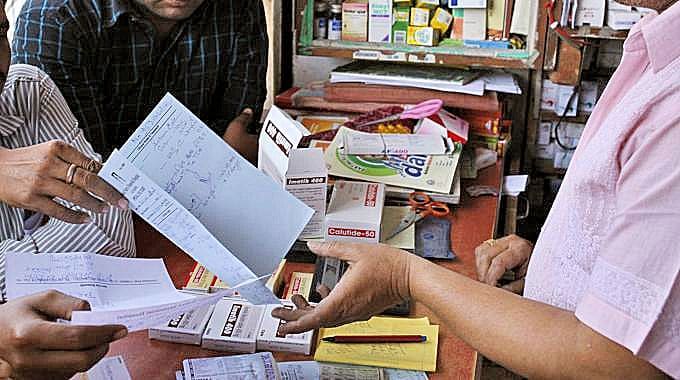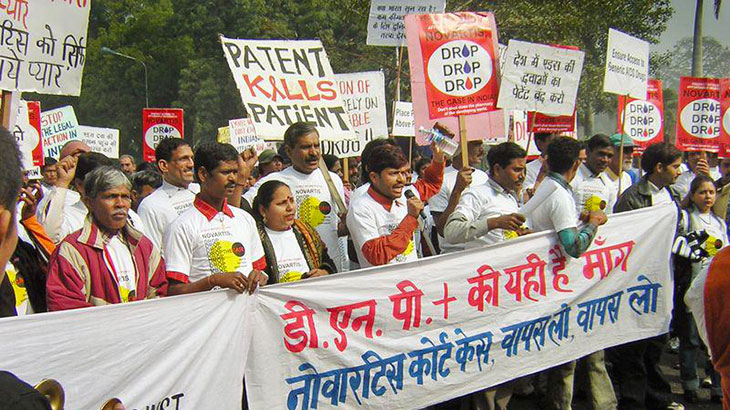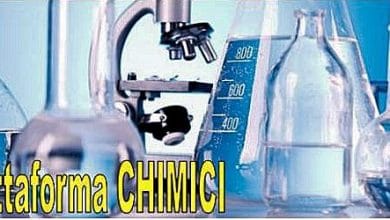
 India's patent office begins hearings today to determine whether US pharmaceutical company Gilead Sciences is entitled to patent for the sofosbuvir, a drug for hepatitis C that currently costs $1,000 a pill in the United States. This proceeding could have serious repercussions for millions of people waiting for affordable life-saving drugs against the disease.
India's patent office begins hearings today to determine whether US pharmaceutical company Gilead Sciences is entitled to patent for the sofosbuvir, a drug for hepatitis C that currently costs $1,000 a pill in the United States. This proceeding could have serious repercussions for millions of people waiting for affordable life-saving drugs against the disease.
The hearings taking place today concern a patent opposition filed by lawyers of the Initiative for Medicines, Access & Knowledge (I-MAK) in November 2013, together with the Delhi Network of Positive People (DNP+). In the opposition it is argued that sofosbuvir is not scientifically innovative and therefore does not require the need to obtain a patent in India. MSF, which relies on generic medicines for its medical activities around the world, supports this effort to make sofosbuvir generically producible.
Patent applications for sofosbuvir have been rejected in Egypt, China and Ukraine, and other patent oppositions have been filed in Argentina, Brazil, Russia, Thailand and the European Union.
People living with Hepatitis C and HIV have gathered outside the patent office in Delhi to urge officials not to blindly and quickly grant patents to multinational drug corporations. The Indian government is under heavy pressure from companies and the US government to weaken the effectiveness of patent policies and grant them more easily.
 “Gilead charges exorbitant prices in many countries and uses patents to keep people in other countries from buying cheaper – yet equally effective – versions of these drugs,” he says. Loon Gangte, of the DNP+. "It feels like we've gone back to the early struggles for HIV treatments, when you lived or died based on where you lived."
“Gilead charges exorbitant prices in many countries and uses patents to keep people in other countries from buying cheaper – yet equally effective – versions of these drugs,” he says. Loon Gangte, of the DNP+. "It feels like we've gone back to the early struggles for HIV treatments, when you lived or died based on where you lived."
Gilead put sofosbuvir on the US market in late 2013 at a price of $1,000 a pill ($84,000 for a 12-week treatment) and set similarly high prices in developed countries. The company has licensing deals with several manufacturers in India who have developed and are starting to market generic versions, but the deals exclude a number of middle-income countries with high rates of hepatitis C. This leaves about 49 million people in these countries – or more than the 40% of all people with hepatitis C worldwide – without access to this drug..
“Gilead wants the world to believe that its licensing deals have solved the problem of global access to this drug but today countries like Thailand, Malaysia and Brazil have to pay the corporation thousands of dollars for sofosbuvir when Indian generic versions are now available for just $335 for a 12-week treatment,” he explains Tahir Amin, lawyer and co-founder of I-MAK. "These licensing agreements allow Gilead to control its competitors in India and are an attempt to convince the patent office that they deserve a patent for a formulation based on outdated scientific data."
 It is estimated that 150 million people worldwide are infected with the hepatitis C virus, and 700,000 die from the disease each year. If left untreated, it can lead to liver cirrhosis and cancer. The old treatments only cured half of the people and could cause intolerable side effects. Sofosbuvir and other "direct-acting antivirals" today allow people to be treated in 12/24 weeks. But because of the price, people in both rich and poor countries are denied treatment.
It is estimated that 150 million people worldwide are infected with the hepatitis C virus, and 700,000 die from the disease each year. If left untreated, it can lead to liver cirrhosis and cancer. The old treatments only cured half of the people and could cause intolerable side effects. Sofosbuvir and other "direct-acting antivirals" today allow people to be treated in 12/24 weeks. But because of the price, people in both rich and poor countries are denied treatment.
“Gilead argues that the price of the drug is the value it provides, but a cure that almost no one can afford is useless,” says Isabelle Andrieux-Meyer, viral hepatitis expert for MSF. “We have started treating people with hepatitis C in several countries, and we want to do it more and more, but we can only convince governments to invest in treatments if they are available at affordable prices wherever they are needed. Restrictive patent and licensing agreements shouldn't hamper middle-income countries' efforts to provide people with the treatments they need to stay alive."
L India is called the "pharmacy of developing countries" because it produces many affordable generic versions of drugs patented elsewhere. Over 80% of antiretroviral drugs used in developing countries come from India, which is able to produce them because its patent law sets high standards for which drugs are or are not worth a patent, allowing manufacturers of generics to compete on the market and lower prices.
India is called the "pharmacy of developing countries" because it produces many affordable generic versions of drugs patented elsewhere. Over 80% of antiretroviral drugs used in developing countries come from India, which is able to produce them because its patent law sets high standards for which drugs are or are not worth a patent, allowing manufacturers of generics to compete on the market and lower prices.
“Hepatitis C drugs like sofosbuvir are relatively simple and cheap compounds to produce,” explains the Dr Andrew Hill, a pharmacologist at the University of Liverpool which has published a study demonstrating that sofosbuvir can be produced for as little as $101 for a 12-week course of treatment. “Gilead has already sold more than $32 billion worth of Hepatitis C treatments in just two years, resulting in a profit of $18 billion last year alone. The continued profit projections of oral hepatitis C drugs are impressive and are not justified by manufacturing costs.
Related news: Hepatitis C. WHO alert on counterfeit medicines circulating in South East Asia
NB.: Sofosbuvir was discovered by Pharmasset and then acquired for development by Gilead Sciences. On December 6, 2013, the US Food and Drug Administration finally approved the drug for the treatment of chronic hepatitis C. On November 22, 2013, the European Medicines Agency (EMA) recommended approval of the drug for the European Union ; since October 2013, the drug has been approved for compassionate use before or after liver transplantation. It is marketed in Italy as Sovaldi; since March 2013 it can be prescribed by centers authorized by the Italian Medicines Agency, for patients with chronic hepatitis C in an advanced stage of the disease or with cirrhosis of the liver. In Italy Harvoni (ledipasvir 90 mg/sofosbuvir 400 mg), also from Gilead Sciences, indicated to treat chronic infection with genotype 1 and 4 hepatitis C virus in adult patients, has been available since June 3, 2015, and is dispensed “under the A-PHT reimbursement regime (direct distribution handbook) bound to the eligibility criteria set out in the Aifa register form. The innovation of Harvoni consists in the extreme simplification of the therapeutic scheme and above all in the applicability of the treatment without associating other drugs.






